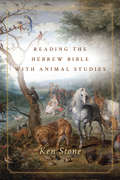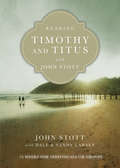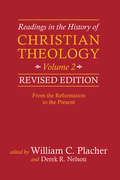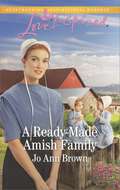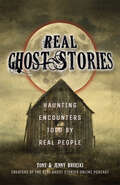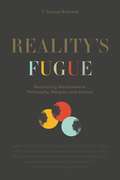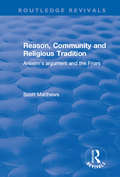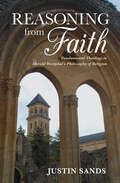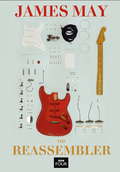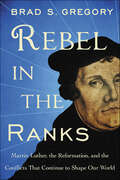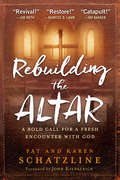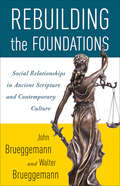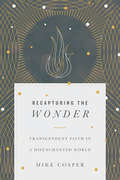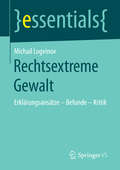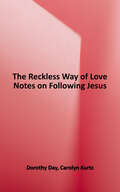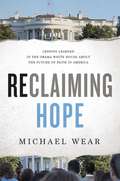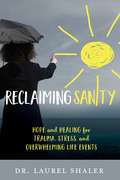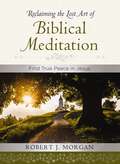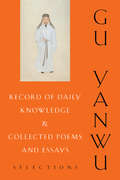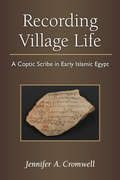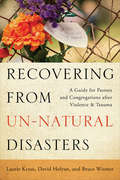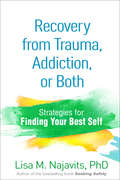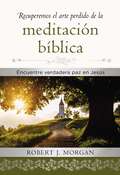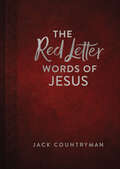- Table View
- List View
Reading the Hebrew Bible with Animal Studies
by Ken StoneAnimal studies may be a recent academic development, but our fascination with animals is nothing new. Surviving cave paintings are of animal forms, and closer to us, as Ken Stone points out, animals populate biblical literature from beginning to end. This book explores the significance of animal studies for the interpretation of the Hebrew Bible. The field has had relatively little impact on biblical interpretation to date, but combined with biblical scholarship, it sheds useful light on animals, animal symbolism, and the relations among animals, humans, and God—not only for those who study biblical literature and its ancient context, but for contemporary readers concerned with environmental, social, and animal ethics. Without the presence of domesticated and wild animals, neither biblical traditions nor the religions that make use of the Bible would exist in their current forms. Although parts of the Bible draw a clear line between humans and animals, other passages complicate that line in multiple ways and challenge our assumptions about the roles animals play therein. Engaging influential thinkers, including Jacques Derrida, Donna Haraway, and other experts in animal and ecological studies, Reading the Hebrew Bible with Animal Studies shows how prehumanist texts reveal unexpectedly relevant dynamics and themes for our posthumanist age.
Reading Timothy and Titus with John Stott: 13 Weeks for Individuals or Groups (Reading the Bible with John Stott Series)
by John StottThe Message of Timothy & TitusThe Message of 2 Timothy
Readings in the History of Christian Theology: From The Reformation To The Present (Readings In The History Of Christian Theology Ser.)
by William C. Placher Derek R. NelsonWilliam Placher and Derek Nelson compile significant passages written by the most important Christian thinkers, from the Reformers of the sixteenth century through the major participants in the contemporary theological conversation. Illustrating the major theologians, controversies, and schools of thought, Readings in the History of Christian Theology is an essential companion to the study of church history and historical theology. Excerpts are preceded by the editors' introductions, allowing the book to stand alone as a coherent history. This revised edition expands the work's scope, drawing throughout on more female voices and expanding to include the most important twenty-first-century theological contributions. This valuable resource brings together the writings of major theologians from the church's history for a new generation of students.
A Ready-Made Amish Family
by Jo Ann BrownThe Amish Nanny As temporary guardian of two sets of young and energetic twins, widowed minister Isaiah Stoltzfus needs a nanny immediately. Keeping the kids happy and safe while also trying to run his blacksmith shop is becoming impossible. So when Clara Ebersol arrives to help, Isaiah is relieved. Able to soothe, teach and delight the children, Clara feels like family. Love-shy Isaiah knows that recently jilted Clara isn't looking for marriage, either. But with matchmakers-including four young kinder-on the job, Isaiah and Clara may soon find their hands clasped in matrimony.
Real Ghost Stories: Haunting Encounters Told by Real People
by Tony Brueski Jenny BrueskiHEART-POUNDING STORIES AND TRUE-LIFE EXPERIENCES UNVEIL THE REAL WORLD OF THE UNDEADOtherworldly entities invade millions of lives every day, maybe even yours. In this book, Tony and Jenny Brueski from Real Ghost Stories Online take the most haunting accounts from their podcast and share them here, including:• HAUNTED BUILDINGS AND BREWERIES• JEALOUS DEMONS AND PROTECTIVE SPIRITS• MESSAGES FROM RETURNED RELATIVES• GHOSTLY BATTLES FROM LONG-LOST WARS• EXORCISMS AND DARK ENERGIES• GRAVEYARD EXPLORATION GONE WRONG
Reality’s Fugue: Reconciling Worldviews in Philosophy, Religion, and Science
by F. Samuel BrainardScience, religion, philosophy: these three categories of thought have organized humankind’s search for meaning from time immemorial. Reality’s Fugue presents a compelling case that these ways of understanding, often seen as competing, are part of a larger puzzle that cannot be rendered by one account of reality alone.This book begins with an overview of the concept of reality and the philosophical difficulties associated with attempts to account for it through any single worldview. By clarifying the differences among first-person, third-person, and dualist understandings of reality, F. Samuel Brainard repurposes the three predominant ways of making sense of those differences: exclusionist (only one worldview can be right), inclusivist (viewing other worldviews through the lens of one in order to incorporate them all, and thus distorting them), and pluralist or relativist (holding that there are no universals, and truth is relative). His alternative mode of understanding uses Douglas Hofstadter’s metaphor of a musical fugue that allows different “voices” and “melodies” of worldviews to coexist in counterpoint and conversation, while each remains distinct, with none privileged above the others. Approaching reality in this way, Brainard argues, opens up the possibility for a multivoiced perspective that can overcome the skeptical challenges that metaphysical positions face.Engagingly argued by a lifelong scholar of philosophy and global religions, this edifying and accessible exploration of the nature of reality addresses deeply meaningful questions about belief, reconciliation, and being.
Reality’s Fugue: Reconciling Worldviews in Philosophy, Religion, and Science
by F. Samuel BrainardScience, religion, philosophy: these three categories of thought have organized humankind’s search for meaning from time immemorial. Reality’s Fugue presents a compelling case that these ways of understanding, often seen as competing, are part of a larger puzzle that cannot be rendered by one account of reality alone.This book begins with an overview of the concept of reality and the philosophical difficulties associated with attempts to account for it through any single worldview. By clarifying the differences among first-person, third-person, and dualist understandings of reality, F. Samuel Brainard repurposes the three predominant ways of making sense of those differences: exclusionist (only one worldview can be right), inclusivist (viewing other worldviews through the lens of one in order to incorporate them all, and thus distorting them), and pluralist or relativist (holding that there are no universals, and truth is relative). His alternative mode of understanding uses Douglas Hofstadter’s metaphor of a musical fugue that allows different “voices” and “melodies” of worldviews to coexist in counterpoint and conversation, while each remains distinct, with none privileged above the others. Approaching reality in this way, Brainard argues, opens up the possibility for a multivoiced perspective that can overcome the skeptical challenges that metaphysical positions face.Engagingly argued by a lifelong scholar of philosophy and global religions, this edifying and accessible exploration of the nature of reality addresses deeply meaningful questions about belief, reconciliation, and being.
Reason, Community and Religious Tradition: Anselm's Argument and the Friars (Routledge Revivals)
by Scott MatthewsThis title was first published in 2001: Reason, Community and Religious Tradition examines key questions about the relationship of rationality to its contexts by tracing the early history of the so-called 'ontological' argument. The book follows Anselm's Proslogion from its origins in the private, devotional context of an eleventh-century monastery to its reception in the public and adversarial contexts of the friars' schools in the thirteenth century. Using unpublished manuscript evidence from the Dominican and Franciscan schools at Oxford, Paris and Bologna in the thirteenth century, Matthews argues that the debate over Anselm's argument embodied the broader religious differences between the Franciscan and Dominican communities. By comparing the most famous figures of the period with their lesser-known contemporaries, Matthews argues that the Friars thought as communities and developed as traditions as they developed their arguments. This book will interest anyone concerned with the nature of rationality, and its relationship to communities and traditions, and what this entails for rational debate across cultural divides. In particular, it offers a fresh perspective on traditional approaches to the rationality of religion and religious belief.
Reasoning from Faith: Fundamental Theology in Merold Westphal’s Philosophy of Religion
by Justin SandsMerold Westphal is considered to be one of the preeminent Continental philosophers of religion. His articulation of faith as the task of a lifetime has become a touchstone in contemporary debates concerning faith's relationship to reason. As Justin Sands explores his philosophy, he illuminates how Westphal’s concept of faith reveals the pastoral, theological intent behind his thinking. Sands sees Westphal's philosophy as a powerful articulation of Protestant theology, but one that is in ecumenical dialogue with questions concerning apologetics and faith's relationship to ethics and responsibility, a more Catholic point of view. By bringing out these features in Westphal's philosophy, Sands intends to find core philosophical methodologies as well as a passable bridge for philosophers to cross over into theological discourses.
The Reassembler
by James May'A typically Mayesque celebration of classic engineering ... May is extraordinarily good at explaining what a carburettor is or outlining how a governor works... It's charming, transfixing and surprisingly intimate...It might be the best thing he's ever done.' - Guardian [review of BBC4 TV series]'Reassembly is merely a form of therapy; something that stimulates a part of my brain that is left wanting in my daily life. When I rebuild a bicycle, I re-order my head. So might you...I'm delighted that you will be holding in your hands a book about putting things back together. It's a subject that fascinates me but which I assumed was a lonely passion that I would take to the grave, unconsummated by the normal channels of human interaction.Welcome! You and I, we are not alone, and our screwdrivers are our flashing Excaliburs as we sally forth to make small parts of the fragmented world whole again.'As in his hit BBC4 TV series, as well as learning the history of the objects, we get a history of the component parts. As James rebuilds an engine, he explains the cylinders, what they are, how they came about and what they do.
Rebel in the Ranks: Martin Luther, the Reformation, and the Conflicts That Continue to Shape Our World
by Brad S. GregoryWhen Martin Luther published his 95 Theses in October 1517, he had no intention of starting a revolution. But very quickly his criticism of indulgences became a rejection of the papacy and the Catholic Church emphasizing the Bible as the sole authority for Christian faith, radicalizing a continent, fracturing the Holy Roman Empire, and dividing Western civilization in ways Luther—a deeply devout professor and spiritually-anxious Augustinian friar—could have never foreseen, nor would he have ever endorsed. From Germany to England, Luther’s ideas inspired spontaneous but sustained uprisings and insurrections against civic and religious leaders alike, pitted Catholics against Protestants, and because the Reformation movement extended far beyond the man who inspired it, Protestants against Protestants. The ensuing disruptions prompted responses that gave shape to the modern world, and the unintended and unanticipated consequences of the Reformation continue to influence the very communities, religions, and beliefs that surround us today.How Luther inadvertently fractured the Catholic Church and reconfigured Western civilization is at the heart of renowned historian Brad Gregory’s Rebel in the Ranks. While recasting the portrait of Luther as a deliberate revolutionary, Gregory describes the cultural, political, and intellectual trends that informed him and helped give rise to the Reformation, which led to conflicting interpretations of the Bible, as well as the rise of competing churches, political conflicts, and social upheavals across Europe. Over the next five hundred years, as Gregory’s account shows, these conflicts eventually contributed to further epochal changes—from the Enlightenment and self-determination to moral relativism, modern capitalism, and consumerism, and in a cruel twist to Luther’s legacy, the freedom of every man and woman to practice no religion at all. With the scholarship of a world-class historian and the keen eye of a biographer, Gregory offers readers an in-depth portrait of Martin Luther, a reluctant rebel in the ranks, and a detailed examination of the Reformation to explain how the events that transpired five centuries ago still resonate—and influence us—today.
Rebuilding the Altar: A Bold Call for a Fresh Encounter With God
by Pat Schatzline Karen SchatzlineThe Holy Spirit has become a stranger. Many long for a closer walk with God, but He seems far away. They go to church. They read the Bible. But they don&’t experience His presence. Why? Because many have forsaken the altar—the place where God is found. When we truly encounter Him again, the light and power of God will flow to our homes, then to our houses of worship, then to the nation, and we will never be the same. In Rebuilding the Altar authors Pat and Karen Schatzline passionately challenge you to return to the altar. You see, the altar is not just a physical location or an instrument in a church or synagogue. Through Christ we can experience a daily encounter with Jesus, who became our altar. We must declare this truth to the deceived. We must raise a standard of holiness and no compromise. We must bring hope to the hurting. It&’s time for change. It&’s time to return to the altar...and encounter God.
Rebuilding the Foundations: Social Relationships In Ancient Scripture And Contemporary Culture
by John Brueggemann Walter BrueggemannIn this unique volume, father-and-son team Walter and John Brueggemann take a close look at our fractured American society and suggest ways for improvement. Using six themes identified by some scholars as the moral foundations of society—care, fairness, liberty, loyalty, authority, and sanctity—they examine the unsustainable patterns of our contemporary society and reveal how those patterns played out in the ancient world of the Old Testament. Brueggemann and Brueggemann demonstrate how comparing the current state of these moral foundations with what God wanted them to be can help us better respond to the challenges of today. They assert that achieving any significant change will require the work of all of us and will be grounded in a vision of neighborliness. Rebuilding the Foundations will inspire readers to reorient toward a better way of living, both for themselves and for all living things.
Recapturing the Wonder: Transcendent Faith in a Disenchanted World
by Mike Cosper• 15th Annual Outreach Magazine Resource of the Year - Inspirational • Evangelical Christian Publishers Association Top Shelf Book Cover Award 2017 When we're young, it's easy to believe in the supernatural, the mysterious, the enchanted. But as we grow older, we learn to be more "rational" and more confident that reality is merely what we can see. Even as Christians who believe in the resurrection, we live as if miracles and magic have been drained from the world. As Mike Cosper wrestled with his own disillusionment, he found writers, thinkers, and artists like Hannah Arendt, Charles Taylor, James K. A. Smith, and David Foster Wallace whose words and ideas reassured him that he was not alone. And he discovered ancient and modern disciplines that shape a Christian way of life and awaken the possibility of living again in an enchanted world. Exquisitely written with thoughtful practices woven throughout, this book will feed your soul and help you recapture the wonder of your Christian walk.
Rechtsextreme Gewalt: Erklärungsansätze – Befunde – Kritik (essentials)
by Michail LogvinovVor dem Hintergrund steigender rechtsextremer Gewalt widmet sich dieses essential der Frage, welche Erkl#65533;rungsans#65533;tze die Rechtsextremismusforschung f#65533;r die rechte Gewaltkriminalit#65533;t erarbeitet hat. Michail Logvinov diskutiert die in den soziologischen Forschungen verbreiteten Interpretationen der Radikalisierungsprozesse im rechten Milieu und arbeitet ihre St#65533;rken und Schw#65533;chen heraus. Er bietet Definitionen der relevanten Gewaltbegriffe und Informationen zur Rolle des Kampfes als Denkfigur und Deutungsmuster im Rechtsextremismus.
The Reckless Way of Love: Notes on Following Jesus (Plough Spiritual Guides: Backpack Classics Ser.)
by Dorothy DayHow do you follow Jesus without burning out? Gold Medal Winner, 2018 Illumination Book Awards, Enduring Light "This thoughtful collection of Day's reflections incorporates abundant material for contemplation, all drawn from her extensive writings ... [which] reveal Day's signature honesty and frequent humor in addressing her hopes and fears and the sources of her inspiration... This welcome compilation provides a window into the fundamental beliefs that undergirded Day's life of faith." -Publishers Weekly, starred review in this guidebook Dorothy Day offers hard-earned wisdom and practical advice gained through decades of seeking to know Jesus and to follow his example and teachings in her own life. Unlike larger collections and biographies, which cover her radical views, exceptional deeds, and amazing life story, this book focuses on a more personal dimension of her life: Where did she receive the strength to stay true to her God-given calling despite her own doubts and inadequacies and the demands of an activist life? What was the unquenchable wellspring of her deep faith and her love for humanity?
Reclaiming Hope: Lessons Learned in the Obama White House About the Future of Faith in America
by Michael R. Wear"An important and extremely timely book...Get it, read it, and talk to others about it." --Timothy Keller, author of Reason for God "A warm, engaging read of the author’s experience with faith, politics, and the intersection (and sometimes collision) of the two. Reclaiming Hope is an important contribution in this age of religious and political polarization." --J.D. Vance, author of Hillbilly Elegy Before he had turned twenty-one, Michael Wear found himself deep inside the halls of power in the Obama administration as one of the youngest-ever White House staffers. Appointed by the president in 2008 to the Office of Faith-based and Neighborhood Partnerships and later directing faith outreach for the president’s 2012 re-election campaign, Wear threw himself wholeheartedly into transforming hope into change, experiencing first-hand the highs and lows of working as a Christian in government. In this unvarnished account of faith inside the world’s most powerful office, Wear gives unprecedented insight into the most controversial stories of the last eight years, from the president’s change of position on gay marriage and the politicization of religious freedom to the administration’s failure to find common ground on abortion and the bitter controversy over who would give the benediction at the 2012 inauguration. Wear also reveals the behind-the-scenes struggles behind some of the administration’s signature achievements, including the adoption tax credit and making human trafficking a presidential priority. And he offers a rare window onto the ways the president himself viewed the role of faith in politics. More than a memoir of the Obama administration, Reclaiming Hope is also a passionate call for faith in the public square, particularly for Christians to see politics as a means of loving one’s neighbor and of pursuing justice for all while promoting racial reconciliation and fighting for religious freedom for people of all faiths. At a time when large numbers of thoughtful Christians are arguing for withdrawal from participation in public institutions, Wear’s experience at the white-hot center of civic life shows how and why Christians must be involved in every aspect of cultural life—even if failures seem to outnumber successes—while working on behalf of the nation’s common good.
Reclaiming Sanity: Hope and Healing for Trauma, Stress, and Overwhelming Life Events
by Dr Laurel ShalerWith a girlfriend’s companionship and a professional counselor’s expertise, Dr. Laurel Shaler walks readers through personal stories and biblical insights that shed light on daily and traumatic stress. In Reclaiming Sanity, she showsHow to find freedom from the pastFive myths about anger and how to overcome themThe antidote for nagging worry and sleepless nightsWays to rebuild trust in othersHow Christ gives true strength Offering effective action steps toward reclaiming sanity, Dr. Shaler guides readers through the healing process, whether they are dealing with a one-time traumatic event or years of hidden pain.
Reclaiming the Lost Art of Biblical Meditation: Find True Peace in Jesus
by Robert MorganLet the words of my mouth and the meditation of my heart be acceptable in Your sight. — Psalm 19:14 Do you long to deepen your intimacy with the Lord? To find a sense of soul-steadying peace? To develop emotional strength? Then you will need to pause long enough to be still and know He is God. Trusted Pastor Robert Morgan leads us through a journey into biblical meditation, which, he says, is thinking Scripture—not just reading Scripture or studying Scripture or even thinking about Scripture—but thinking Scripture, contemplating, visualizing, and personifying the precious truths God has given us. The practice is as easy and portable as your brain, as available as your imagination, as near as your Bible, and the benefits are immediate. As you ponder, picture, and personalize God’s Word, you begin looking at life through His lens, viewing the world from His perspective. And as your thoughts become happier and holier and brighter, so do you.
Record of Daily Knowledge and Collected Poems and Essays: Selections (Translations from the Asian Classics)
by Yanwu GuGu Yanwu pioneered the late-Ming and early Qing-era practice of Han Learning, or Evidential Learning, favoring practical over theoretical approaches to knowledge. He strongly encouraged scholars to return to the simple, ethical precepts of early Confucianism, and in his best-known work, Rizhi lu (Record of Daily Knowledge), he applied this paradigm to literature, government, economics, history, education, and philology. This volume includes translations of selected essays from Rizhi lu and Gu Yanwu's Shiwen Ji (Collected Poems and Essays), along with an introduction explaining the personal and political dimensions of the scholar's work.Gu Yanwu wrote the essays and poems featured in this volume while traveling across China during the decades immediately after the fall of the Ming Dynasty. They merge personal observation with rich articulations of Confucian principles and are, as Gu said, "not old coin but copper dug from the hills." Like many of his contemporaries, Gu Yanwu believed the Ming Dynasty had suffered from an overconcentration of power in its central government and recommended decentralizing authority while strengthening provincial self-government. In his introduction, Ian Johnston recounts Gu Yanwu's personal history and reviews his published works, along with their scholarly reception. Annotations accompany his translations, and a special essay on feudalism by Tang Dynasty poet and scholar Liu Zongyuan (773–819) provides insight into Gu Yanwu's later work on the subject.
Recording Village Life: A Coptic Scribe in Early Islamic Egypt
by Jennifer CromwellRecording Village Life presents a close study of over 140 Coptic texts written between 724–756 CE by a single scribe, Aristophanes son of Johannes, of the village Djeme in western Thebes. These texts, which focus primarily on taxation and property concerns, yield a wealth of knowledge about social and economic changes happening at both the community and country-wide levels during the early years of Islamic rule in Egypt. Additionally, they offer a fascinating picture of the scribe’s role within this world, illuminating both the practical aspects of his work and the social and professional connections with clients for whom he wrote legal documents. Papyrological analysis of Aristophanes’ documents, within the context of the textual record of the village, shows a new and divergent scribal practice that reflects broader trends among his contemporaries: Aristophanes was part of a larger, national system of administrative changes, enacted by the country’s Arab rulers in order to better control administrative practices and fiscal policies within the country. Yet Aristophanes’ dossier shows him not just as an administrator, revealing details about his life, his role in the community, and the elite networks within which he operated. This unique perspective provides new insights into both the micro-history of an individual’s experience of eighth-century Theban village life, and its reflection in the macro social, economic, and political trends in Egypt at this time. This book will prove valuable to scholars of late antique studies, papyrology, philology, early Islamic history, social and economic history, and Egyptology.
Recovering From Un-Natural Disasters: A Guide For Pastors And Congregations After Violence And Trauma
by Laurie Kraus David Holyan Bruce WismerRecovering from Un-Natural Disasters is a must-read handbook for pastors and church leaders of communities who could or perhaps already have experienced an un-natural disaster, such as gun violence, suicides, or sexual abuse. <P><P>Unlike natural disasters, un-natural disasters deal with the concept of sin and require a different recovery strategy. In this book, readers will explore the four phases of human-caused disaster — Devastation and Heroism, Disillusionment, Reforming, and Wisdom — and receive step-by-step suggestions to use with their faith community during the recovery process. Example worship resources, including prayers, music suggestions, and sermons that are appropriate to use during periods of trauma and recovery, are included.
Recovery from Trauma, Addiction, or Both: Strategies for Finding Your Best Self
by Lisa M. NajavitsTrauma and addiction are two of the most common and difficult issues that people face--but it truly is possible to heal. In this motivating book, leading expert Lisa Najavits explains the link between trauma and addiction and presents science-based self-help strategies that you can use no matter where you are in your recovery. Every chapter features inspiring words from people who have "been there," plus carefully designed reflection questions, exercises, and other practical tools. Learn how you can: *Build coping skills so that the future is better than the past. *Keep yourself safe and find support. *Set your own goals and make a plan to achieve them at your own pace. *Choose compassion over self-blame and shame. *Move toward your best self--the person you want to be. Mental health professionals, see also the author's Seeking Safety: A Treatment Manual for PTSD and Substance Abuse, which presents an evidence-based treatment approach developed specifically for PTSD and substance abuse.
Recuperemos el arte perdido de la meditación bíblica: Encuentra verdadera paz en Jesús
by Robert J. MorganÚnase al autor best seller y pastor de confianza Robert Morgan en un viaje para descubrir el arte perdido de la meditación bíblica. Aprenda lo que dice la Biblia sobre la meditación y cómo incorporar la meditación basada en la Biblia en su vida para disminuir la ansiedad, reducir el estrés y encontrar la verdadera paz en Jesús.¿Anhela profundizar su intimidad con el Señor? ¿Encontrar una sensación de paz que estabilice su alma? ¿Desarrollar fuerza emocional? Entonces, tendrá que detenerse el tiempo suficiente para estar quieto y saber que Él es Dios.El pastor de confianza Robert Morgan nos guía a través de un viaje hacia la meditación bíblica, que dice es pensar las Escrituras, no solo leer las Escrituras o estudiar las Escrituras o incluso pensar en las Escrituras, sino pensar las Escrituras, contemplar, visualizar y personificar las preciosas verdades que Dios nos ha dado.La práctica es tan fácil y portátil como su cerebro, tan disponible como su imaginación, tan cerca como su Biblia, y los beneficios son inmediatos. Mientras usted reflexiona, imagina y personaliza la Palabra de Dios, comienza a mirar la vida a través de su lente, viendo el mundo desde su perspectiva. Y a medida que sus pensamientos se vuelven más felices, más santos y más brillantes, usted cambia por igual.Sean gratos los dichos de mi boca y la meditación de mi corazón delante de ti, Oh Jehová, roca mía, y redentor mío. — Salmo 19.14Reclaiming the Lost Art of Biblical MeditationsJoin best-selling author and trusted pastor Robert Morgan on a journey to discover the lost art of Biblical meditation. Learn what the Bible says about meditation and how to incorporate Bible-based meditation into your life to decrease anxiety, reduce stress and find true peace in Jesus.Do you long to deepen your intimacy with the Lord? Find a sense of peace that stabilizes your soul? Develop emotional strength? Then you will have to stop long enough to be still and know that He is God.Trusted pastor Robert Morgan leads us through a journey into biblical meditation, which he says is thinking the Scriptures, not just reading the Scriptures or studying the Scriptures or even thinking the Scriptures, but thinking the Scriptures, contemplating, visualizing and embodying the precious truths that God has given us.The practice is as easy and portable as your brain, as available as your imagination, as close as your Bible, and the benefits are immediate. As you reflect, imagine and personalize God's Word, you begin to look at life through your lens, seeing the world from your perspective. And as your thoughts become happier, holier and brighter, you change accordingly.Let the words of my mouth and the meditation of my heart be acceptable in thy sight, O Lord, my rock, and my redeemer. - Psalm 19.14
The Red Letter Words of Jesus
by Jack CountrymanThe words of Jesus—red letter words—are the most important and life changing ever spoken.Discover the things Jesus thought were most important.What He says about how to live.His relationship with God and the Holy Spirit.And His overwhelming love for you.More than 115 passages from the Bible are considered with illuminating explanation and background facts. Most of all, discovering Jesus&’ words will breathe life into your relationship with Him and help you draw close to the One who knows you fully and loves you completely.The Red Letter Words of Jesus, a classic gift book by bestselling author Jack Countryman, will encourage you in your faith journey, whether you are seeking Christ for the first time or have been following Him for decades.With Jesus&’ words on one beautiful, highly designed page, and an informative explanation on the facing page, The Red Letter Words of Jesus will bring to life the teachings of Jesus in a new way.
